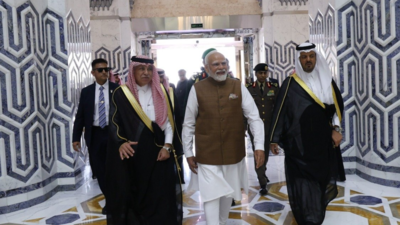
RIYADH: India and Saudi Arabia have agreed to significantly deepen cooperation in technology and tourism, highlighting new areas of partnership during Prime Minister Narendra Modi's state visit to the Kingdom on April 22, 2025.
Both sides identified emerging technologies, digital governance, and sustainable tourism as key drivers of future bilateral engagement, an official press release by the ministry of external affairs (MEA) stated.
Emphasising the strategic importance of technological collaboration, the two nations agreed to work closely in areas such as artificial intelligence, cybersecurity, semiconductors, and other advanced sectors. The leaders underlined the transformative role of digital governance and committed to exploring joint initiatives in this domain.
As a major step forward, both sides welcomed the signing of a Memorandum of Understanding between the Telecom Regulatory Authority of India and the Communications, Space and Technology Commission of Saudi Arabia. The agreement aims to boost cooperation in regulatory practices and digital sector development, reinforcing shared priorities in innovation and connectivity.
Tourism also emerged as a major pillar of the evolving relationship. India and Saudi Arabia agreed to enhance collaboration in the tourism sector through capacity building, knowledge exchange, and sustainable tourism practices, stated the press release.
The two sides noted the growing potential for cooperation in media, entertainment, and sports - sectors supported by the strong cultural and people-to-people connections between the two countries.
The visit, undertaken at the invitation of Crown Prince and Prime Minister Prince Mohammed bin Salman bin Abdulaziz Al Saud, marked Prime Minister Narendra Modi's third trip to the Kingdom. It built upon the momentum of the Crown Prince's historic visit to India in September 2023, where he co-chaired the first meeting of the India-Saudi Arabia Strategic Partnership Council and participated in the G20 Summit.
Beyond tech and tourism, the leaders also reaffirmed shared commitments in other key areas, including climate action, circular carbon economy, and regional security. Both sides expressed satisfaction with the deepening of cooperation across cybersecurity, maritime border security, and counter-narcotics efforts.

 6 hours ago
37
6 hours ago
37




























 English (US)
English (US)